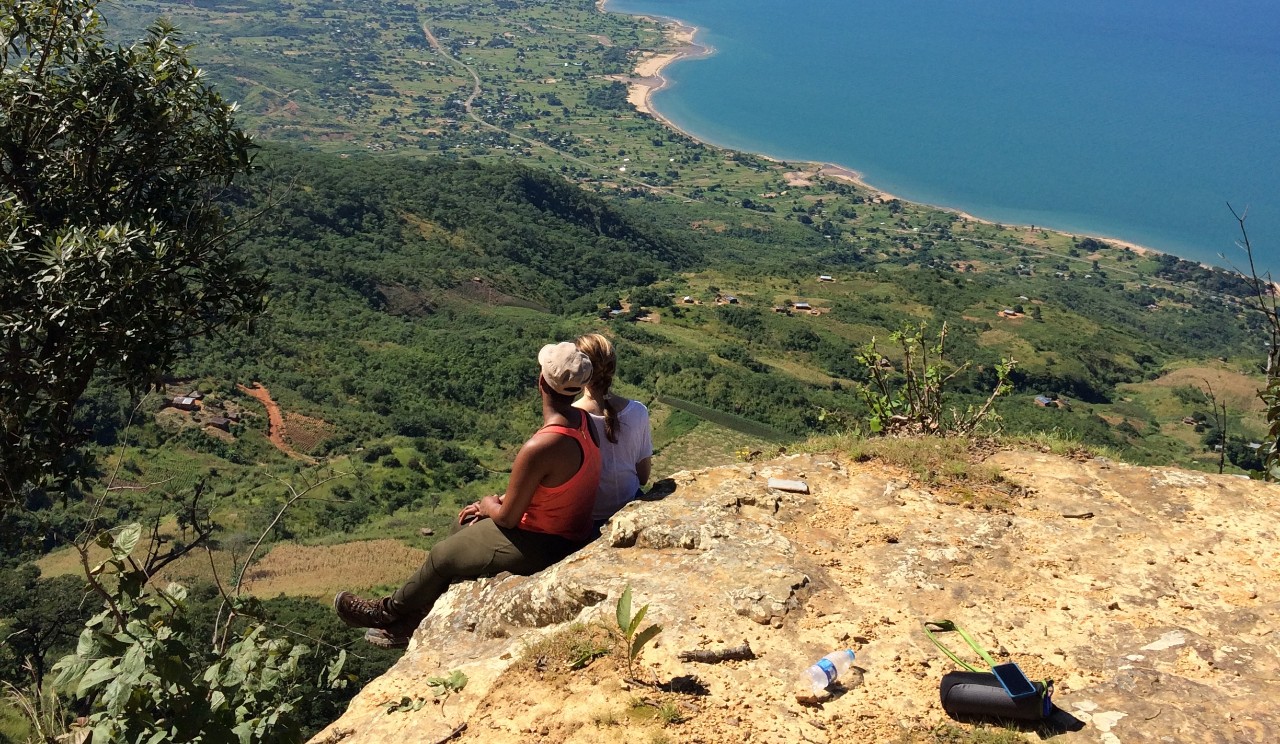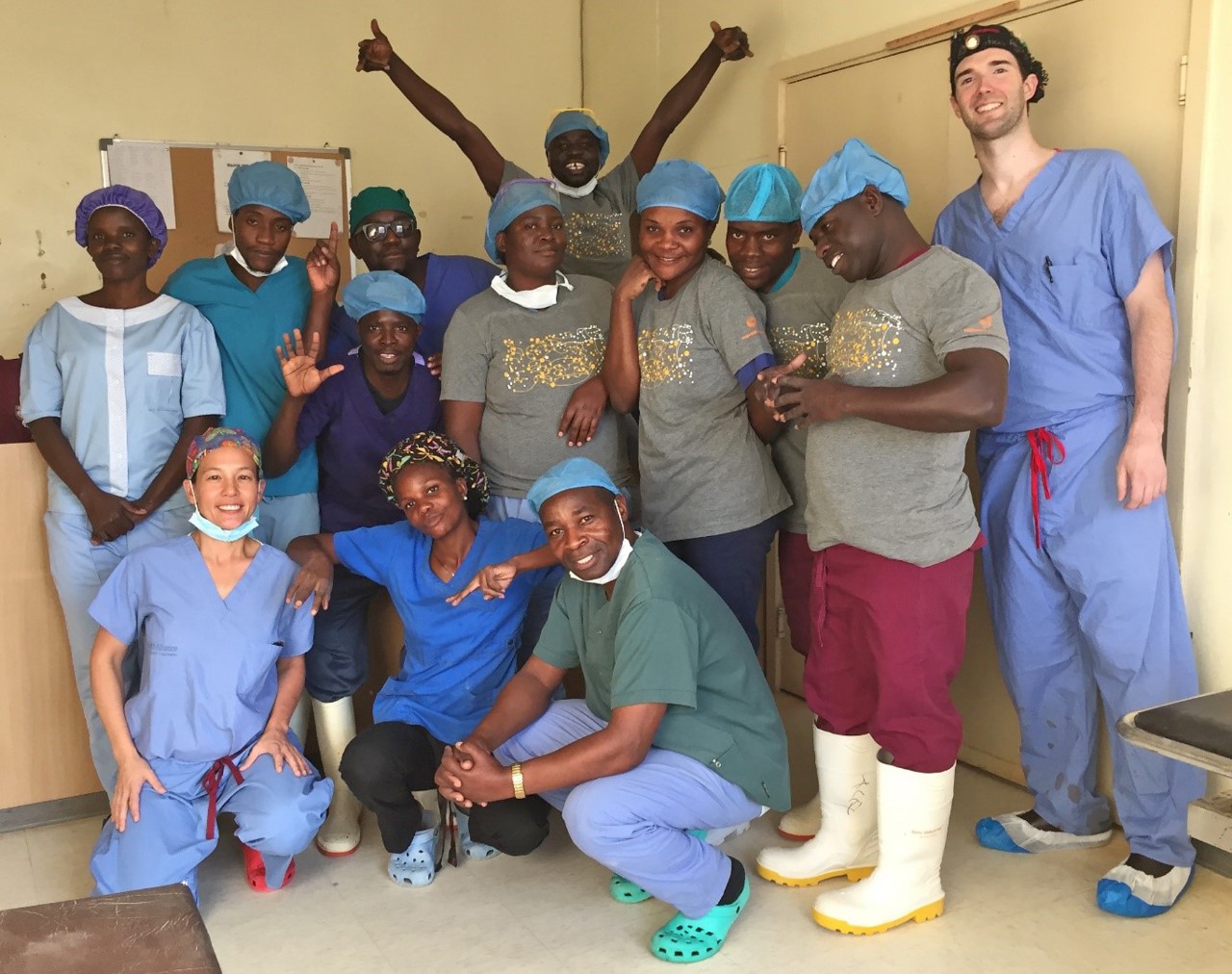
UC Global Surgery program expands horizons
Through a global surgery rotation in Malawi, UC residents learn to be adaptive, appreciative
Traumatic brain injury, intestinal perforation from typhoid fever, appendicitis, severe burns from motorcycle accidents, infant hydrocephalus, and advanced tuberculosis leading to paralysis and pressure sores. Those are just a few of the cases seen on a “typical” Friday morning at Mzuzu Central Hospital in Northern Malawi by visiting surgical resident Young Kim.
Kim, a current University of Cincinnati resident who completed a global surgery rotation in Malawi in 2018, calls his two month experience at Mzuzu Hospital in a word, “humbling.”
“Malawi has a completely different breadth of treatment modalities compared to the American population. CT scans are rare, interventional radiology doesn’t exist, and blood tests are limited to complete blood counts and some electrolytes. Anticoagulation is too expensive for most Malawians, and sterile technique is often restricted by lack of soap and running water,” says Kim.

Though one of the world’s least-developed countries, Malawi is known as ‘the warm heart of Africa’ for its culture of generosity and kindness. Mzuzu is Malawi’s third-largest city, and its hospital, Mzuzu Central, serves a population of approximately 2.5 million. With only a handful of hospitals across the country, you can imagine the needs and burden on the hospital are great and varied.
Mzuzu Central Hospital is also home to a unique program of the UC College of Medicine—a global surgery residency rotation. Surgical residents are offered the opportunity to spend 8 weeks living in Malawi and working under the mentorship of a full-time UC faculty member Charles Park, MD, assistant professor of surgery and a graduate of the UC general surgery residency (2011). Park is on the staff of the hospital year-round and has lived in Malawi since May 2015.
Park says there is a big learning curve for the surgery residents upon arrival for their rotation. “I have found most of the residents adaptive, creative and very proactive in dealing with the challenges presented by the resource-poor environment,” he says.
“They will regularly experience unexpected challenges that may thwart the ability to perform surgeries, such as the lack of supplemental oxygen or a functioning anesthesia machine to perform cases under general anesthesia; as another example, the intermittent lack of running water or electricity can thwart the timely sterilization of needed surgical instruments,” says Park.
“We often use unwieldy and aging surgical instruments that can make more delicate parts of procedures significantly more challenging. But residents quickly learn to use the available resources to substitute for things we don't have.”

He adds though, that most residents are prepared to hit the ground running in their new environment because of the advice from those who have been involved with the program before them.
In the 350+ bed Mzuzu Central Hospital, upwards of 100 patients may be admitted for surgical conditions, divided among the five surgical wards. To meet this surgical need, residents operate three full days a week, while also managing the care of patients already in the hospital and evaluating new patients who present to the surgical clinic or come by referral to the hospital on any given day from health clinics or district hospitals throughout northern Malawi. There is an opportunity to make a significant impact on dozens of lives on a daily basis.
“If a patient presents to the hospital with an emergency condition, that patient takes top priority, and we mobilize our team and resources to get that patient to the operating room as soon as possible,” says Park.
“In Malawi, people tend to present very, very, late—they have waited so long, maybe because the village has had to raise money for the transportation to the hospital. Getting one patient from their rural home to the district hospital can devastate the funds of an entire village. Everybody will work to support that family,” says Jocelyn Logan, MD, a graduate of the UC general surgery residency program (2010), who founded the UC Global Surgery Program.
“It’s no surprise therefore that by the time they arrive to their local district hospital, they can be very sick, and it may be up to the clinical officers at the district to see and treat these complicated and advanced cases. But they are such strong tight-knit communities they make tremendous sacrifices for one another,” Logan says.

Called back to Malawi
Logan was raised with a globally oriented mindset from a young age. As a teenager, she traveled extensively with her family, including to Malawi; her parents run a water well-building mission/nonprofit that operates throughout Africa.
Once she joined the UC faculty, she quickly made her intentions known—she wanted to launch a program that would have an impact on both her surgery residents as well as make a difference to an underserved community. She was provided seed money to scout out candidates for a program and after visiting 12 hospitals across four countries in Africa, she kept coming back to Malawi, and ended up in northern Malawi at Mzuzu Central Hospital.
“It wasn’t my intention, but I ended up right around where my parents had done work in Malawi,” she says. Through some persistence and a mutual contact (her driver), Logan got ahold of the head surgeon at Mzuzu Central Hospital on the day she was scheduled to fly back to the U.S.
“It turned out to be a perfect match. The hospital had just enough infrastructure—they had anesthesia, they had equipment—while also a great demand for providers/surgeons,” says Logan.
To get the program off the ground, Logan coordinated with a Malawian surgeon to map out what a residency rotation would look like.
“It was important for the partnership to be bi-directional. There’s a risk involved when you bring people into an unfamiliar hospital ... we could just be in the way, or take a long time to adjust to the new surroundings, different environment, culture, language barriers, even disease types. It was critical that our residents not only gain something from the experience, but that they also have something to offer the people of Malawi,” says Logan.
Park was working on faculty at Brigham and Women’s Hospital in Boston after graduation from the UC surgical residency program around the time Logan was launching the program, and he jumped at the opportunity to go to Malawi and supervise the first surgical resident to go. When Park initially went to Malawi, he was one of two surgeons in the entire region. Two surgeons for 2.5 million people is one of the lowest surgeon-per-population rates in the world.
As the UC program developed, other university academic surgery programs became interested. The residency rotation has now expanded to include partnerships with Washington University in St. Louis, University of Kansas and University of Louisville. “Now, we have more residents interested than we can currently accommodate,” says Logan.
As a point to Logan’s intent to make the experience bi-directional, visiting residents to Malawi provide educational sessions to nursing students, clinical officer students, medical interns, and junior staff members. In Malawi, there are so few trained physicians that clinical officers make up the backbone of the health care delivery system. Similar to a physician assistant, clinical officers receive three years of health sciences and hospital training. In Malawi, they are expected to function as general practitioners in the outpatient and inpatient settings, as well as perform procedures such as cesarean sections, aligning fractured bones, and hernia repairs.
Logan recalls one resident asking the clinical officers to provide a list of topics to talk about while there. “They were so excited, and they came back with four pages of ideas,” she says. “The hunger for knowledge is powerful there, and it's very inspirational; you realize it’s such a blessing to have what we have here and how much they value their work.”
“What we’ve built up now is an amazing experience for these residents,” says Logan, “and not just because of the surgical cases, but also because of the people of Malawi. It’s a culture of generosity and sharing, gentleness, and that gets passed on in the experience.”
Kim says, “Over my two months there, I truly believe that we did everything we could to care for these patients and educate the clinicians. But, in the end, I think it is us that walk away with the greatest benefits from this humbling experience.”
PROJECT C.U.R.E. supplies in kind gift
A shipment of $300,000 in medical equipment is on its way to Mzuzu. The supplies are an in-kind donation to the UC Global Surgery program from Project C.U.R.E, following a request from the UC Foundation. The supplies include items like an anesthesia machine, patient monitoring equipment, hospital beds and stretchers, specialized surgical equipment for the orthopedic, dental and obstetrics teams, a defibrillator, incubator and a fetal monitor as well as thousands of units of smaller daily use items like gauze, paper gowns, catheters and syringes.
Project C.U.R.E. identifies, solicits, collects, sorts and distributes medical supplies and services according to the imperative needs of the world.
All photos in story provided by Young Kim and Charles Park.
Related Stories
Machine learning brings new insights to cell’s role in...
April 30, 2025
Researchers led by the University of Cincinnati’s Anna Kruyer and the University of Houston’s Demetrio Labate have published research in the journal Science Advances applying object recognition technology to track changes in brain cell structure and provide new insights into how the brain responds to heroin use, withdrawal and relapse.
Most teens prescribed SSRIs did not have recommended follow-up...
April 30, 2025
The University of Cincinnati and Cincinnati Children's Hospital Medical Center's Martine Lamy commented to Medscape on new research that found fewer than half of the adolescents prescribed a selective serotonin reuptake inhibitor (SSRI) at two large Chicago pediatric primary care clinics had a follow-up visit within the recommended 6 weeks.
Students shine at 2025 CAHS Scholarly Showcase
April 29, 2025
Nearly 200 students and more than 40 alumni judges participated in the 2025 CAHS Scholarly Showcase at the University of Cincinnati, featuring 82 research projects across allied health disciplines.
